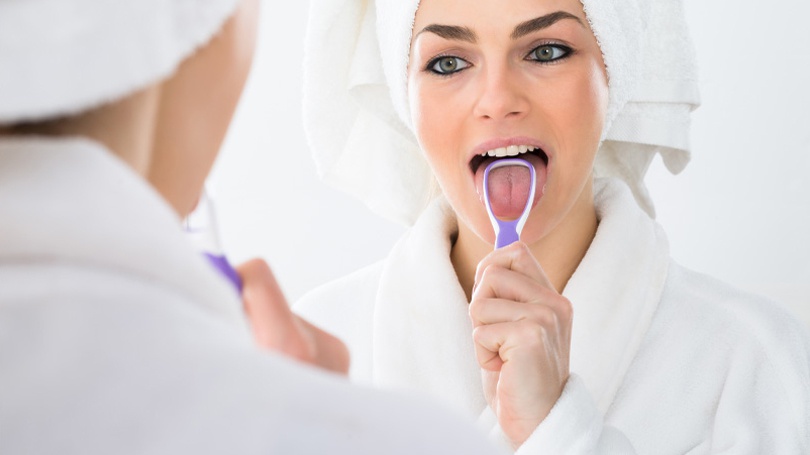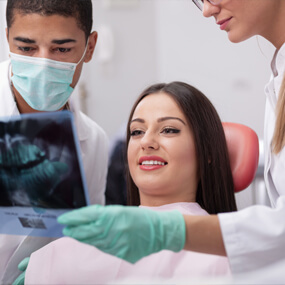The Importance of Cleaning Your Tongue and How to Do It

There are many people that brush their teeth twice a day, floss daily, and visit their dentist every six months that are still undermining their oral health by overlooking their tongues. Your tongue is a muscular organ integral to chewing, swallowing, and speaking, and it is covered by taste buds that let you sense not only flavors but textures. Your tongue is also a haven for bacteria.
Much of the bacteria that collects on your tongue is good bacteria required for a healthy ecosystem within the mouth. But there are also bad bacteria that cause bad breath, gum disease, and tooth decay, and cleaning your tongue avoids the accumulation of bad bacteria, food particles, and dead cells.
The Importance of Your Tongue
The tongue is an organ often taken for granted because without we could not speak, whistle, enjoy the taste of food or even chew and swallow it. While the tongue is often referred to as a muscle, it is actually an organ that comprises multiple different muscles. Each muscle in that group has a distinct job.
There is a small muscle at the tip of the tongue, for instance, that you use to move food from the front of your mouth to the back, and it is also essential for making certain sounds, such as pronouncing the letter L. Other muscles are responsible for twisting the tongue into various shapes and moving it up, down, in, out, and side to side. The muscles at the back of your mouth move food into your esophagus in controlled amounts so that you do not choke, and they are needed to make hard sounds like K and G.
The Oral Health Benefits of Cleaning Your Tongue
Just as bacteria builds up between your teeth and beneath the gumline—where it can form plaque and harden into calculus if not removed—it accumulates on your tongue. Your tongue is coated in hundreds of tiny structures known as papillae, which house taste buds and other functions. There are grooves between these bumps, and these areas accumulate bacteria, food particles, and dead cells.
Your tongue has a layer of mucous that is refreshed over time, and that process can trap bacteria and debris. The trapped substances can cause bad breath as well as discoloration of the tongue. A dirty tongue can also redeposit that bacteria onto the teeth and gums, which means that your teeth and gums can be attacked by acids throughout the night, for instance, even though you just brushed and flossed before going to bed.
The Proper Way to Clean Your Tongue
Most dentists agree that you can clean your tongue by either brushing or scraping it. Brushing can be done with your toothbrush. Moisten the brush. Start at the back of the tongue, and use gentle circular motions as you move toward the tip. If you are brushing your teeth and gums, it is fine to use the fluoride toothpaste on the tongue, and the residue can actually be beneficial. In addition to gently brushing your tongue, you should brush your cheeks and the roof of your mouth.
An alternative to brushing your tongue is scraping it. To do this in a safe manner requires you to purchase a dedicated tongue scraper, but these devices—even products made from surgical steel—are relatively inexpensive and can last a lifetime. You can purchase them online but find them in most local pharmacies as well. They are shaped so that the scraper can glide over the tongue. This removes the top layer of mucus and all the bacteria, food particles, and dead cells it contains. Many people find it easier to avoid the gag reflex when using a tongue scraper as opposed to brushing the back of the tongue.
To use a scraper, stick your tongue out and places the curved end of the tool at the back of the tongue. Use gentle, even pressure as you move the scraper from the back to the front. The direction is important so as not to inadvertently ingest the materials you are trying to remove. The debris will be on the edge of the scraper, and you can just wash it off in the sink. If you want to disinfect your tongue scraper, you can do so by soaking it in hydrogen peroxide as you would with a toothbrush.
How Often You Should Clean Your Tongue
Brushing or scraping your tongue should be performed whenever you brush. It is generally advised that you brush once in the morning after breakfast and again at night before going to bed. It is very important not to skip scraping before bed since bad bacteria can be quite disruptive overnight.
See Your Dentist Twice a Year
No matter how comprehensive and consistent your oral hygiene routine, it is imperative to see your dentist bi-annually for a checkup. During that visit, your dentist will perform a comprehensive exam, which extends far beyond your teeth and gums to your tongue and even your head and neck. Dentists are integral to early diagnoses, and he or she may notice lumps, lesions, and other symptoms that can indicate various disease and other health conditions, such as cancer, anemia, and autoimmune disorders.
Maintain a Clean and Healthy Tongue
Avoid bad breath and protect your teeth and gums by brushing or scraping your tongue on a daily basis. You also need regular visits to your dentist to ensure that you are winning the battle against plaque and preventing gum disease and tooth decay. Schedule an appointment with Scottsdale Cosmetic Dentistry Excellence to have your teeth cleaned and to have Jeffrey D. Clark, DDS, perform a comprehensive exam. You can call us at 480 585 1853 to make that appointment or with any questions that you may have.




